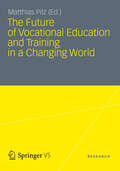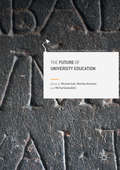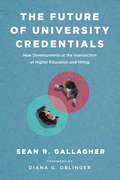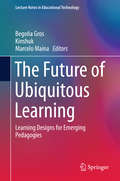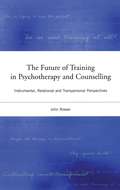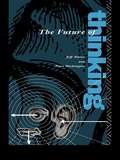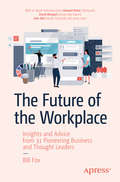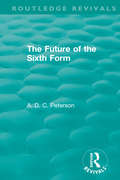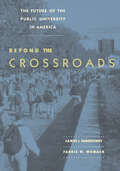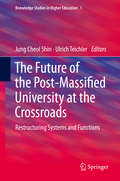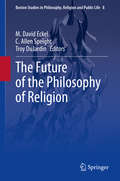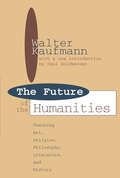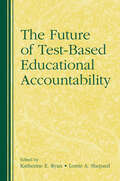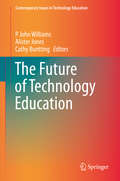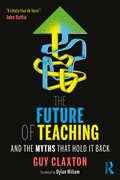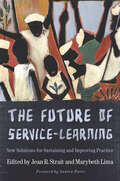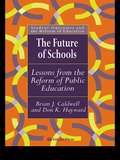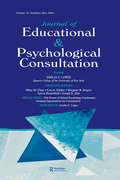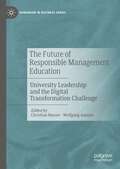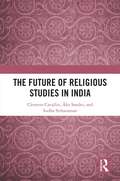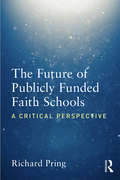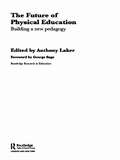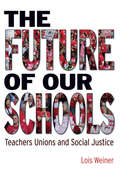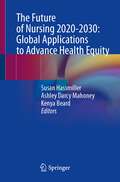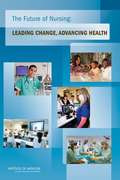- Table View
- List View
The Future of Vocational Education and Training in a Changing World
by Matthias PilzAcross the globe, vocational education and training is characterised by a number of over-arching trends, including the increasing use of technology, the growing importance of information and communications systems, and changes to national demographics. At the interface between the education and training system and the world of work, VET faces the challenge of tackling these changes, of making a constructive contribution to solving the problems posed by the transition from education to employment, and of ensuring that the next generation has the skills it - and the economy - needs. This volume comprises thirty individual contributions that together add up to a comprehensive overview of the current situation in vocational education and training, its strengths and weaknesses, and its prospects. VET experts from Canada, the USA, India, China, Japan and Korea, as well as from a number of European countries, focus on their national context and how it fits in to the bigger picture. The contributions combine theoretical discussions from various strands of VET research with evidence from country case studies and examples from current practice.
The Future of University Education
by Michał Izak Monika Kostera Michał ZawadzkiThis collected volume of essays offers glimpses of the future of university education. While universities consider the spirit of theoretical exchange and intellectual pursuit to be a defining trait of their identity, this book argues that this heritage is disappearing under the influence of the short-term demands of societies and markets. Universities used to be sites of dissent, civil courage and societal conscience, but have now instead become little more than pseudo-businesses, rendering them incapable of remaining critical or independent. However, with more people going to university every year, there is a strong resistance to the notion that the university as a collegial and critical institution is dead, among academics as well as the broader public. With contributions from scholars across the world, this edited collection explores the ramifications of marketization on universities, and provides glimpses of what higher education will look like in the future. It will be of great interest to teachers and students in higher education, as well as policy makers and those interested in the current and future state of higher education.
The Future of University Credentials: New Developments at the Intersection of Higher Education and Hiring
by Sean R. Gallagher2017 Phillip E. Frandson Award for Literature in the Field of Professional, Continuing, and/or Online Education, University Professional and Continuing Education Association (UPCEA)The Future of University Credentials offers a thorough and urgently needed overview of the burgeoning world of university degrees and credentials. At a time of heightened attention to how universities and colleges are preparing young people for the working world, questions about the meaning and value of university credentials have become especially prominent. Sean Gallagher guides us through this fast-changing terrain, providing much-needed context, details, and insights. The book casts a wide net, focusing on traditional higher education degrees and on the myriad certificates and other postsecondary awards that universities and other institutions now issue. He describes the entire ecosystem of credentials, including universities and colleges, employers, government agencies, policy makers and influencers—and, not least, the students whose futures are profoundly affected by these certifications. And he looks intently at where university credentials might be headed, as educational institutions seek to best serve students and employers in a rapidly changing world. The result is an unprecedented, comprehensive look at the current credentialing landscape in higher education—as well as at the future challenges and opportunities for this vital field.
The Future of Ubiquitous Learning
by Begoña Gros Kinshuk Marcelo MainaThis book explores emerging pedagogical perspectives based on the design of new learning spaces supported by digital technologies and brings together some of the best research in this field. The book is divided into three themes: foundations of emerging pedagogies, learning designs for emerging pedagogies and, adaptive and personalized learning. The chapters provide up-to-date information about new pedagogical proposals, and examples for acquiring the requisite skills to both design and support learning opportunities that improve the potential of available technologies.
The Future of Training in Psychotherapy and Counselling: Instrumental, Relational and Transpersonal Perspectives
by John RowanThe Future of Training in Psychotherapy and Counselling presents a revealing and stimulating account of the current state of training that demonstrates how training will have to adapt if it is to sucessfully meet the needs and challenges of the future.In an attempt to look afresh at the whole question of training, John Rowan proposes that there are three ways of doing therapy and any examination of training has to consider each of these:* the instrumental, where the main emphasis is on the treating the client or patient * the authentic way, where the main emphasis is on meeting the client or patient* the transpersonal way, where main emphasis is on linking with the client in a more personal way. Each approach makes different assumptions about the self, about the relationship, and about the level of consciousness involved in doing therapy. By challenging the basic precepts of traditional training, John Rowan encourages the reader to reconsider subjects including the difference between counselling and psychotherapy, culture and ethics, the origins of disturbance in clients, and child development. The Future of Training in Psychotherapy and Counselling provides a much needed new perspective that will compel all psychotherapists and counsellors to take a closer look at training in the field.
The Future of Thinking: Rhetoric and Liberal Arts Teaching
by Peter Washington Ga* Jeff MasonLearning to think is a complex process made up of reading, writing listening, speaking and remembering textual materials. The aim of this topical book is to encourage practical educational reform in the Humanities by taking the emphasis away from the reception of texts to their production. Adapting rhetorical teaching methods, the authors encourage students to participate in the activities of thinking giving them short written and verbal exercises to develop conceptual competences and linguistics skills. It is argued that these methods can be implemented successfully across a wide number of humanities subjects and that they encourage the development of practical transferable skills, both cognitive and linguistic.The authors have used these methods successfully in class, and the book includes sample exercises, the initial results, and feedback from their students.
The Future of the Workplace: Insights and Advice from 31 Pioneering Business and Thought Leaders
by Bill FoxAs society evolves in the direction of innovation, digital influence, and rapid information delivery, workplaces must follow suit in order to remain relevant and engaging to modern employees. Bill Fox, a thought leader and author with decades of experience in the business world, has interviewed 31 global business leaders about how they create workplaces that continue to adapt with the times, where each team thrives at each level. These lessons go beyond the limitations of “best practices” and “working smarter”, and instead focus on insights and strategies to bridge the gap between the Industrial Age and the new “Forward-Thinking Age”. The Future of the Workplace offers advice for the leaders, managers, and employees of both today and tomorrow. Fox discusses macro and micro topics with influential figures such as Howard Behar, former president of Starbucks; Steph Holloway, body language and communication expert; David Marquet, author of Turn the Ship Around; John Bell, former CEO of Jacobs Suchard; Perry Marshall, author of Evolution 2.0; and many more. You will gain applicable tools to shift attitudes and bring transformative change to your organization, creating a productive and realistic future for both your team and yourself. The very nature of the dynamic between employer and employee is divergent from what it was merely 10 years ago. Perspectives from different members of multiple types of teams and company structures are offered in this book in order to ensure a well-rounded view of how the future of workplaces can best accommodate everybody. The world is significantly shifting in personal, economic, and political ways, and The Future of the Workplace is your guide to effectively embracing these new challenges for the better.What You Will LearnShares new insights to help resolve some of today's most vexing workplace challengesReveals perspectives from different members on a team on how the workplace has evolved Learn how to trigger change to create a more adequate and healthy workplace environmentWho This Book Is ForAnyone looking for new and better ways to transform the workplace including, consultants, managers, and leaders
The Future of the Sixth Form (Routledge Revivals)
by A.D.C. PetersonOriginally published in 1973, the nature of the sixth form and the objectives of sixth-form schooling were important issues in the field of education at the time. The author here provides a searching analysis of the changing structure and composition of the sixth form. He surveys the continued expansion in sixth-form numbers and suggests ways in which the curriculum could be improved. He examines critically a number of myths about the actual practice of sixth-form education, and considers the case for sixth-form ‘blocks’ or colleges. In a final chapter the author discusses the mechanism of change in this crucial area of education.
The Future of the Public University in America: Beyond the Crossroads
by James J. Duderstadt Farris W. WomackIn the United States, public colleges and universities educate more than 80 percent of the nation's 11 million college students. Public universities conduct the majority of the country's campus-based research and produce most of the nation's doctors, lawyers, engineers, teachers, and other professionals and public leaders. They provide critical services such as agricultural and industrial technology, health care, and economic development, and they help students of all ages develop more rewarding careers and more meaningful lives.Written for everyone who is interested in and concerned about the nation's public universities, The Future of the Public University in America offers a view from the perspective of two experienced professionals. James J. Duderstadt, former president of the University of Michigan, and Farris W. Womack, former executive vice president and chief financial officer of the University of Michigan, explore the unique challenges facing public higher education today. They look at the forces driving change—economic imperatives, technology, and market forces—as well as the characteristics of the public university that make change difficult: the nature of its various campus communities, its governance system, its management and decision-making processes, and its leadership. The authors conclude by suggesting strategies at the state and federal level to preserve and strengthen public higher education as a resource for future generations.
The Future of the Post-Massified University at the Crossroads
by Jung Cheol Shin Ulrich TeichlerThe modern university started as an innovative model - a research-driven teaching and service model in the 19th century -, but the contemporary university is in a crisis of identity. The major challenge is how to harmonize different missions, e. g. , teaching, research, and service. The triple function has become questionable and research now dominates the other two functions in contemporary higher education. This book takes a step towards further academic and policy discussions on the restructuring the triple functions of university and designing the future of the post-massified university.
The Future of the Philosophy of Religion (Boston Studies in Philosophy, Religion and Public Life #8)
by M. David Eckel C. Allen Speight Troy DuJardinThis collection of essays on the philosophy of religion and its future brings together accomplished thinkers across several related fields, from comparative philosophy to analytic and continental philosophy of religion and beyond. Contributing authors address pressing questions including: Where does philosophy stand in relation to religion and the study of religion in the 21st century? How ought the philosophy of religion to interact with religious studies and theology to make for fruitful interdisciplinary engagement? And what does philosophy uniquely have to offer to the broad discourse on religion in the modern world? Through exploring these questions and more, the authors’ goal is not that of meeting the philosophical future, but of forging it. Readers will enter a vivid conversation through engaging essays which demonstrate the importance of disciplinary openness and show that we do not need to sacrifice depth in order to achieve breadth. Modernity and postmodernity come together in a constantly evolving discussion that moves the philosophy of religion forward, while keeping an eye toward the experience accumulated in past centuries. This book will interest students of philosophy, theology, religious studies, and other fields that wonder about the place of philosophy and religion in today’s world. It also has much to offer advanced scholars in these fields, through its breadth and forward thinking.
Future of the Humanities: Teaching Art, Religion, Philosophy, Literature and History (Foundations Of Higher Education)
by Walter KaufmannThis book locates the humanities in six general fields of study: religion and philosophy, art and music, and literature and history. It offers suggestions for interdisciplinary work around topics such as punishment, and death and dying.
The Future of Test-Based Educational Accountability
by Katherine Ryan Lorrie ShepardFirst Published in 2008. Routledge is an imprint of Taylor & Francis, an informa company.
The Future of Technology Education
by P John Williams Alister Jones Cathy BunttingTwenty-five years ago there was increasing optimism in policy, curriculum and research about the contribution that technology education might make to increased technological literacy in schools and the wider population. That optimism continues, although the status of technology as a learning area remains fragile in many places. This edited book is offered as a platform from which to continue discussions about how technology education might progress into the future, and how the potential of technology education to be truly relevant and valued in school learning can be achieved. The book results from a collaboration between leading academics in the field, the wider group of authors having had input into each of the chapters. Through the development of a deep understanding of technology, based on a thoughtful philosophy, pathways are discussed to facilitate student learning opportunities in technology education. Consideration is given to the purpose(s) of technology education and how this plays out in curriculum, pedagogies, and assessment. Key dimensions, including design, critique, students' cultural capital are also explored, as are the role and place of political persuasion, professional organisations, and research that connects with practice. The discussion in the book leads to a conclusion that technology education has both an ethical and moral responsibility to support imaginings that sustain people and communities in harmony and for the well being of the broader ecological and social environment.
The Future of Teaching: And the Myths That Hold It Back
by Guy ClaxtonIt’s time for the educational slugfest to stop. ‘Traditional’ and ‘progressive’ education are both caricatures, and bashing cartoon images of each other is unprofitable and unedifying. The search for a new model of education – one that is genuinely empowering for all young people – is serious and necessary. Some good progress has already been made, but teachers and school leaders are being held back by specious beliefs, false oppositions and the limited thinking of orthodoxy. Drawing on recent experience in England, North America and Australasia, but applicable round the world, The Future of Teaching clears away this logjam of bad science and slack thinking and frees up the stream of much-needed innovation. This timely book aims to banish arguments based on false claims about the brain and poor understanding of cognitive science, reclaim the nuanced middle ground of teaching that develops both rigorous knowledge and ‘character’, and lay the foundations for a 21st-century education worthy of the name.
The Future of Service-Learning: New Solutions for Sustaining and Improving Practice
by Andrew Furco Jean Strait Marybeth LimaAs a new generation of practitioners engages with service learning, at a time when higher education faces questions about learning outcomes and costs, and in the context of such issues as globalization and the environment, this book poses important questions about practice, institutional sustainability, and future directions. Among these are:What counts as service learning? What value does it bring to institutions? Is it appropriate for all students? How is globalization impacting service learning? Divided into three thematic parts, this book successively covers institutional and administrative issues; service learning as a springboard for research; and presents new practices that address emerging challenges and changing student populations. The contributors review how different institutional types have structured their service learning activities; address the issue of centralization or decentralization; propose better ways to form community partnerships; consider promotion and tenure implications; postulate framing service-learning and community engagement as scholarship; and examine service-learning as a springboard for research. Further chapters offer a new blueprint for funding to achieve sustainability; examples of international service learning from a European perspective; a case study and framework for using on-line formats to extend the reach of a program; raise the urgent issue of the experiences and contributions of underrepresented students; and present the rationale and processes for developing effective student-led evaluation of programs.
The Future Of Schools: Lessons From The Reform Of Public Education (Student Outcomes And The Reform Of Education Ser.)
by Brian J. Caldwell Don HaywardThis text provides an analysis of the efforts to establish systems of self-managing schools around the world. The core of this book is the description of the transformation of the education system in the state of Victoria, Australia, from dependence in a highly centralized and bureaucratized structure to one that values local decision making and the creation of a system of self-managing schools. The text goes on to show how these and similar programmes in other nations could lay the foundations for similar reform. The authors propose that there must be changes in the role of key stakeholders, including government, community and profession; traditional approaches must be challenged and new ways to fund schools to be canvassed.
The Future of School Psychology Conference: Framing Opportunties for Consultation: A Special Double Issue of the Journal of Educational and Psychological Consultation
by Emilia C. LopezFirst published in 2005. This Volume 15, numbers 3 and 4 of the Journal of Educational and Psychological Consultation 2004 and has the future of school psychology conference- ‘framing opportunities for Consultation' as its special focus.
The Future of Responsible Management Education: University Leadership and the Digital Transformation Challenge (Humanism in Business Series)
by Christian Hauser Wolfgang AmannBusiness schools have been criticized for several things, such as lacking relevance, a too weak ethics orientation, dated paradigms, or commercialization. Simultaneously, there has been much positive change and accelerated dynamics toward forming future-ready companies and graduates. This book outlines how to better understand and master the digital transformation challenge. It is essential that business school deans, program directors, and faculty members embrace new opportunities to bring the UN-backed Principles of Responsible Management Education (PRME) to life successfully.Part of the Humanism in Business series, this book constitutes a valuable resource for leaders in universities and business schools, as well as individual faculty members aspiring to optimize how they respond to digital transformation. It can also be of use to those studying responsible management education, leadership and business ethics more generally.
The Future of Religious Studies in India
by Clemens Cavallin Åke Sander Sudha SitharamanThis book looks at how religious studies is framed and taught in India. It addresses the contradiction between the country’s vibrant religious life and the dearth of comparative and social scientific religious studies programs across Indian universities. The volume: • Studies the efforts by Rabindranath Tagore in Santiniketan and Mohan Malaviya in Varanasi, to introduce and institutionalize religious studies in India; • Discusses the notions of religion and spirituality and situates the failure of the ‘secularization thesis’ in the context of modern India; • Provides concrete suggestions on how to develop religious studies in relation to global citizenship and Indian cultural heritage with the hope of initiating a larger discussion. A unique contribution to the study of religion in society and education, the book will be indispensable to students and researchers of theology, history, philosophy, sociology, secularization, globalization, religious studies, education studies, and South Asian studies.
The Future of Publicly Funded Faith Schools: A Critical Perspective
by Richard PringThe Future of Publicly Funded Faith Schools addresses and critically examines the arguments both for and against the continued maintenance of faith-based schools within a publicly funded state system. Addressing the issue systemically, first grounding the discussion in the practical world of education before raising the central philosophical issues stemming from faith-based education, it provides a balanced synthesis of the different arguments surrounding faith schools. The book expounds upon the different threats facing faith-based schools, including their perceived potential to undermine social cohesion within a multi-cultural society, and the questioning of their right to receive public funding, and examines what these mean for their future. Examining these threats, it questions: What it means for a school to be ‘faith-based’. The nature of religious education both within and without a faith-based school environment. The ethical, epistemological, and political issues arising from faith-based education. The concepts of the common good and social cohesion. Whether there is possible reconciliation between opposing parties. The Future of Publicly Funded Faith Schools makes a unique contribution to the literature in this area and is crucial reading for anyone interested in what the future holds for publicly funded faith schools including academics, researchers, and postgraduate students in the fields of education, religious studies, policy, and politics of education, sociology, and philosophy.
The Future of Physical Education: Building a New Pedagogy (Routledge Research in Education #Vol. 6)
by Anthony LakerAnthony Laker leads an outstanding international team of educational theorists in critically examining the theoretical underpinnings of physical education, and in challenging the rhetoric, the practices and the pedagogies that prevail in our schools. There has been a great deal of discussion surrounding the value of this subject in schools, particularly around the form that physical education should take. The domination of physical education teaching by the scientific / technical discourses is problemized and it is suggested that this domination limits the potential of the subject to be culturally and contextually relevant to students in schools. This edited collection aims to extend the worldwide academic debate of the future of physical education in schools by challenging the prevailing 'authorised curricula'.Each contributor address a key contemporary issue in physical education bringing different perspectives as they relate to the evolving issues of the subject. They ask important questions about where we intend to take the knowledge we have gained from a legacy of positive research. These chapters tackle critical issues in modernist physical education and suggest how a re-evaluation could contribute to the continuing advancement of the subject for more diverse educational benefits. Laker draws this body of work together in a conclusion that describes a theoretically and pedagogically innovative physical education curriculum for the 21st century.This book is a summary of the current state of research in physical education. It invites debate and discussions in the field and re-conceptualises physical education theory into inclusive practices located in the postmodern school world.
The Future of Our Schools
by Lois WeinerIn The Future of Our Schools, Lois Weiner explains why teachers who care passionately about teaching and social justice need to unite the energy for teaching to efforts to self-govern and transform teacher unions. Drawing on research and her experience as a public school teacher and union activist, she explains how to create the teachers unions public education desperately needs.Lois Weiner is a professor at New Jersey City University and has been a life-long teacher union activist who has served as an officer of three different union locals. She is the author of The Global Assault on Teaching, Teachers, and their Unions: Stories for Resistanc e .
The Future of Nursing 2020-2030: Global Applications to Advance Health Equity
by Susan Hassmiller Ashley Darcy Mahoney Kenya BeardThis book provides an application of the concepts and recommendations of The Future of Nursing 2020-2030: Charting a Path to Achieve Health Equity Report, a Consensus Study from the US National Academy of Medicine. It offers complementary guidance through tools, tips, examples and storytelling. As such this book, written by prominent international academics and nurse practitioners, offers program and policy recommendations for health equity. As the world’s largest and most trusted workforce, nurses are in a key position thus must step up to help address these inequities now. The recent pandemic has laid bare these inequities in ways that are stark and demanding of our attention. This book offers program and policy recommendations, along with case studies, designed to empower nurses to understand and ACT to improve health equity. This text provides nurses an opportunity to clearly see the need for an equitable, just, and fair society. There has never been a more urgent call to action.
The Future of Nursing: Leading Change, Advancing Health
by Institute of Medicine of the National AcademiesThe Future of Nursing explores how nurses' roles, responsibilities, and education should change significantly to meet the increased demand for care that will be created by health care reform and to advance improvements in America's increasingly complex health system. At more than 3 million in number, nurses make up the single largest segment of the health care work force. They also spend the greatest amount of time in delivering patient care as a profession. Nurses therefore have valuable insights and unique abilities to contribute as partners with other health care professionals in improving the quality and safety of care as envisioned in the Affordable Care Act (ACA) enacted this year. Nurses should be fully engaged with other health professionals and assume leadership roles in redesigning care in the United States. To ensure its members are well-prepared, the profession should institute residency training for nurses, increase the percentage of nurses who attain a bachelor's degree to 80 percent by 2020, and double the number who pursue doctorates. Furthermore, regulatory and institutional obstacles -- including limits on nurses' scope of practice -- should be removed so that the health system can reap the full benefit of nurses' training, skills, and knowledge in patient care. In this book, the Institute of Medicine makes recommendations for an action-oriented blueprint for the future of nursing.
